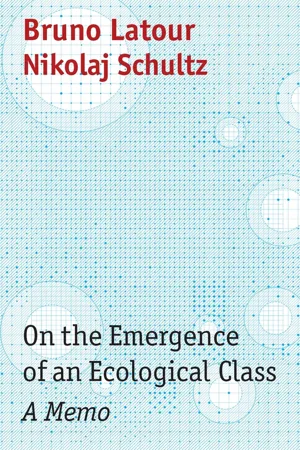
- English
- ePUB (mobile friendly)
- Available on iOS & Android
About this book
Under what conditions could ecology, instead of being one cluster of movements among others, organise politics around an agenda and a set of beliefs? Can ecology aspire to define the political horizon in the way that liberalism, socialism, conservatism and other political ideologies have done at various times and places? What can ecology learn from history about how new political movements emerge, and how they win the struggle for ideas long before they translate their ideas into parties and elections?
In this short text, consisting of seventy-six talking points, Bruno Latour and Nikolaj Schultz argue that if the ecological movement is to gain ideological consistency and autonomy it must offer a political narrative that recognises, embraces and effectively represents its project in terms of social conflict. Political ecology must accept that it brings along division. It must provide a convincing cartography of the conflicts it generates and, based on this, it must try to define a common horizon of collective action. In order to represent and describe these conflicts, Latour and Schultz propose to reuse the old notions of 'class' and 'class struggle', albeit infused with a new meaning in line with the ecological concerns of our New Climate Regime. Advancing the idea of a new ecological class, assembled by its collective interests in fighting the logic of production and safeguarding our planet's conditions of habitability, they ask: how can a proud and self-aware ecological class emerge and take effective action to shape our collective future?
Frequently asked questions
- Essential is ideal for learners and professionals who enjoy exploring a wide range of subjects. Access the Essential Library with 800,000+ trusted titles and best-sellers across business, personal growth, and the humanities. Includes unlimited reading time and Standard Read Aloud voice.
- Complete: Perfect for advanced learners and researchers needing full, unrestricted access. Unlock 1.4M+ books across hundreds of subjects, including academic and specialized titles. The Complete Plan also includes advanced features like Premium Read Aloud and Research Assistant.
Please note we cannot support devices running on iOS 13 and Android 7 or earlier. Learn more about using the app.
Information
Table of contents
- Cover
- Title Page
- Copyright
- The Authors
- Memorandum
- I: Class struggles and classification struggles
- II: A prodigious extension of materialism
- III: The great turnaround
- IV: A class that’s legitimate again
- V: A misalignment of affects
- VI: A different sense of history in a different cosmos
- VII: The ecological class is potentially in the majority
- VIII: The indispensable and too often abandoned battle of ideas
- IX: Winning power, but what kind?
- X: Filling the emptiness of the public space from below
- Postface Will ecology ever be politics as usual?
- End User License Agreement